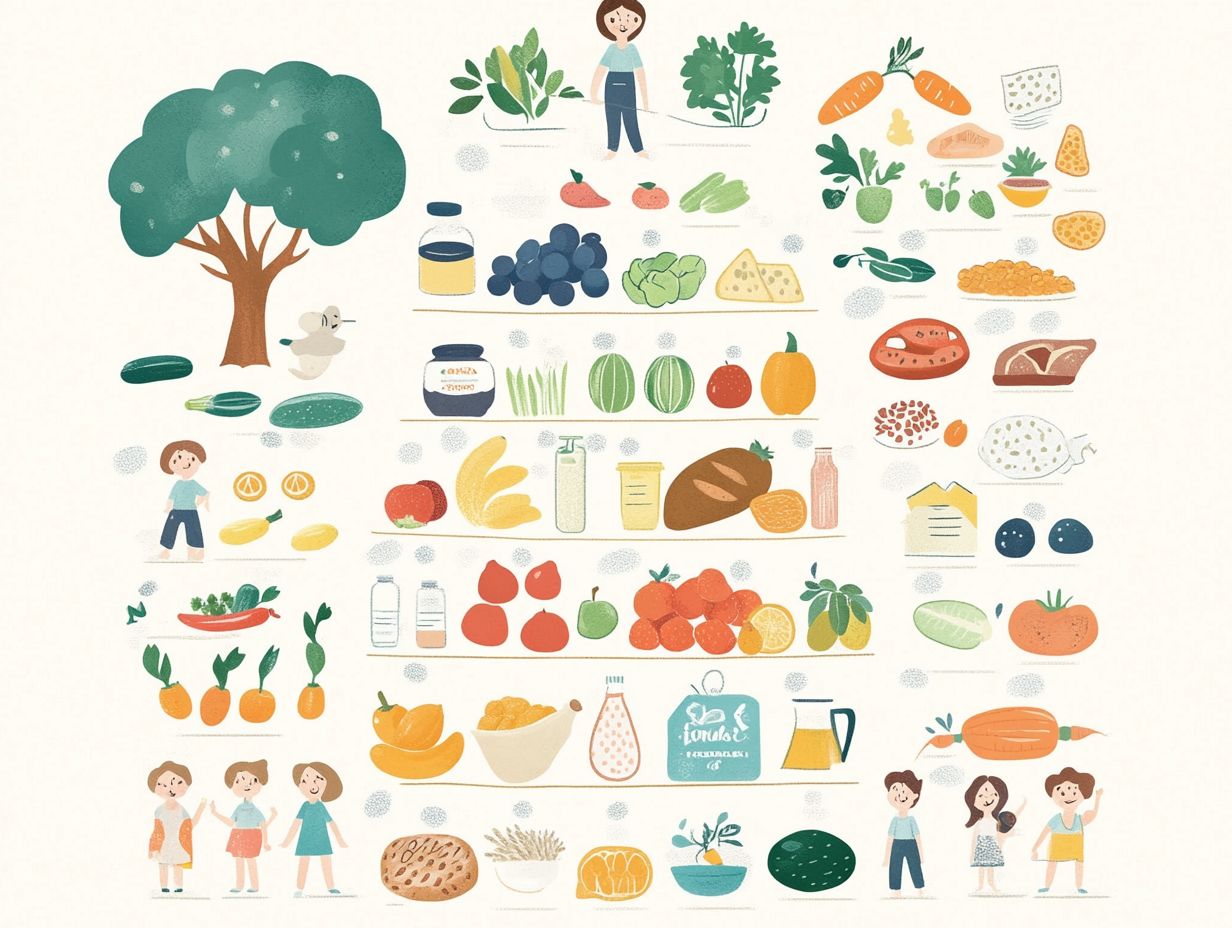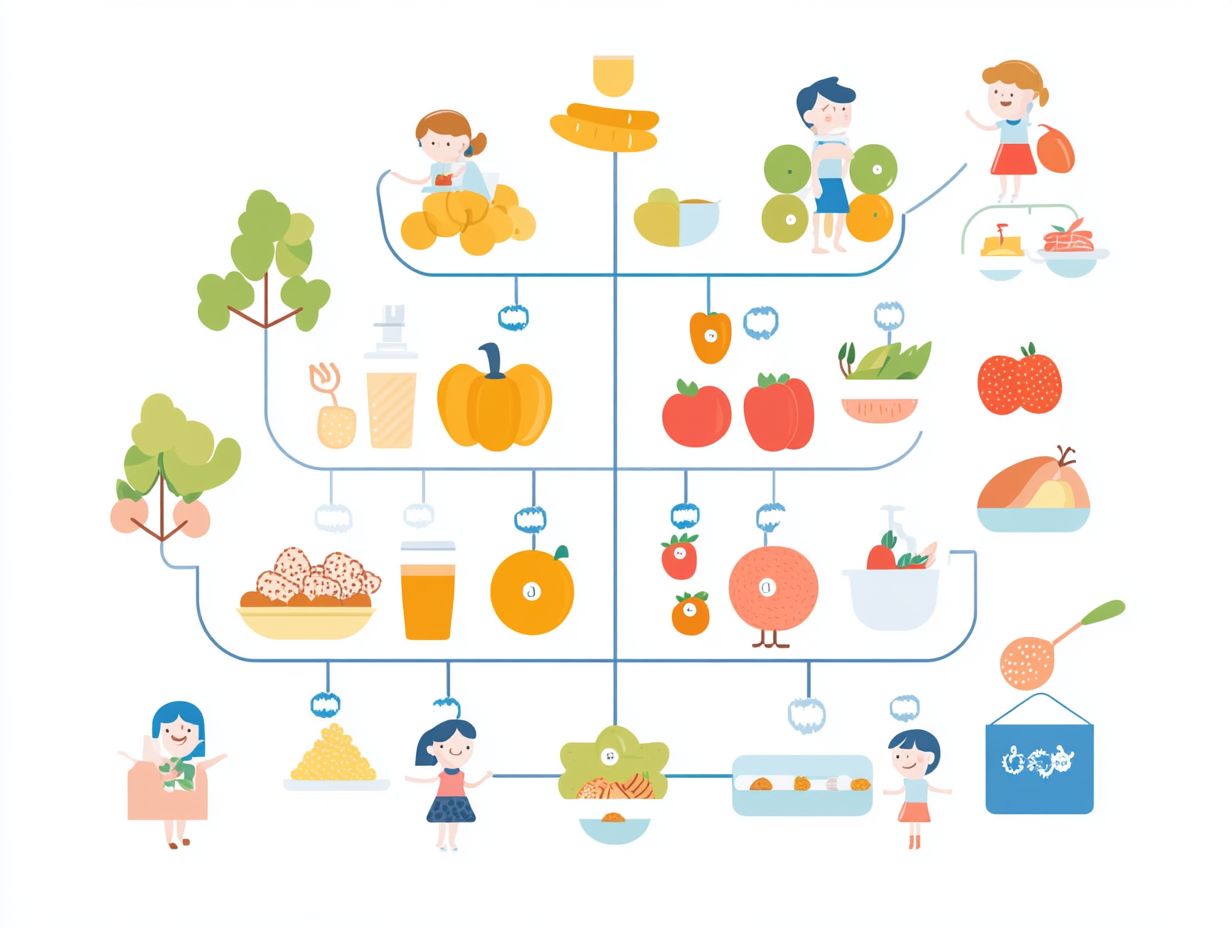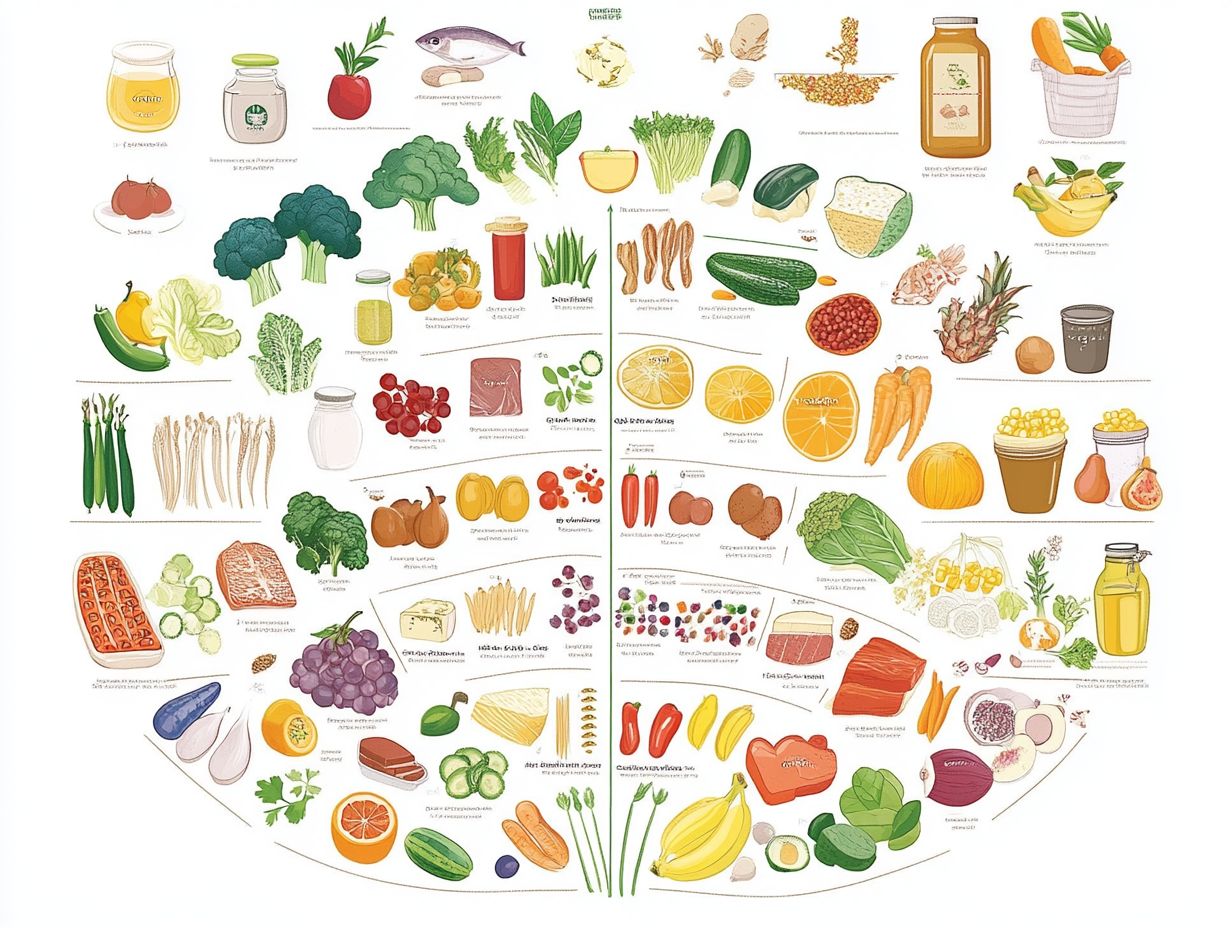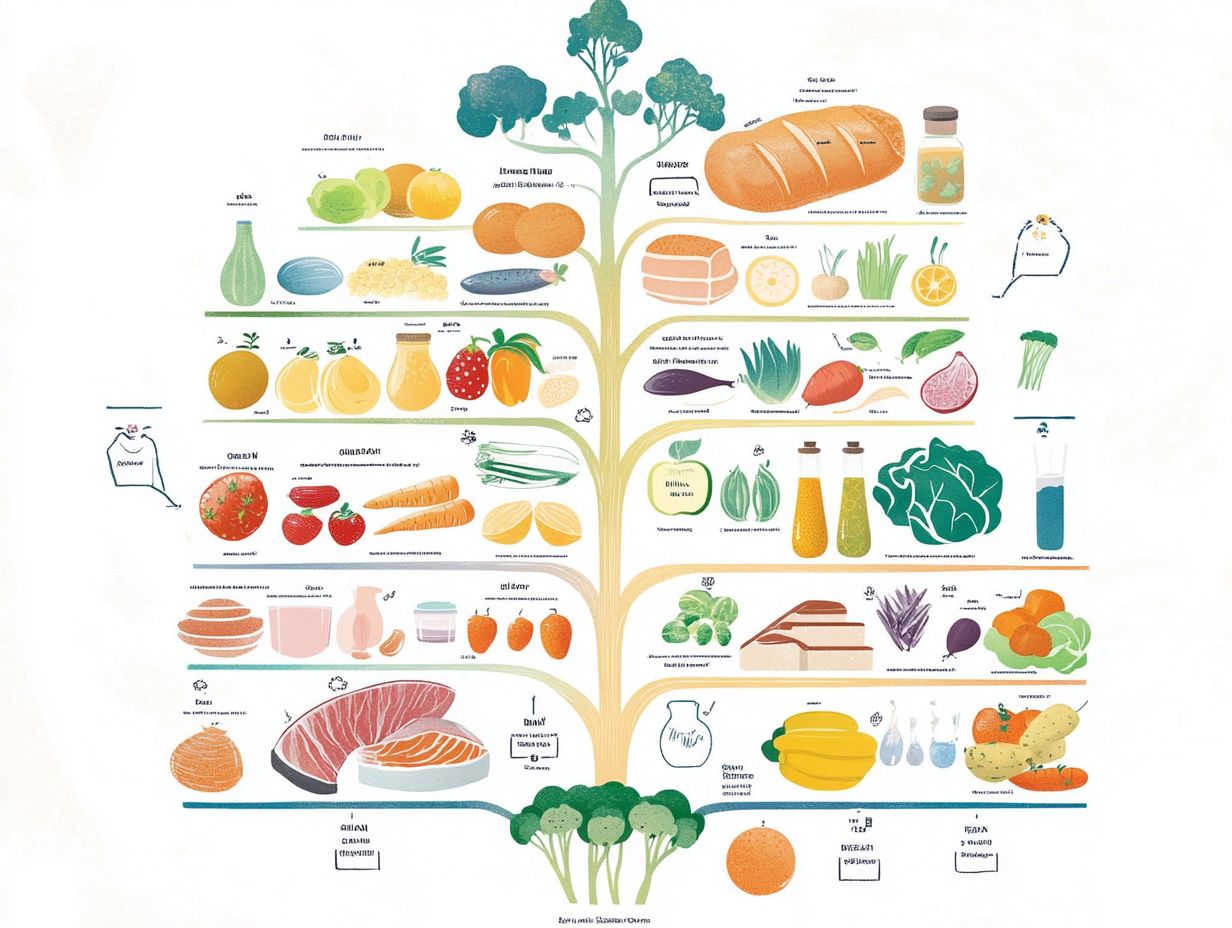Dietary Guidelines for Different Life Stages
Are you ready to make the best food choices for yourself and your loved ones? Navigating nutrition can feel overwhelming, particularly as your dietary needs shift throughout various stages of life.
This guide clearly outlines essential dietary guidelines specifically crafted for infants, toddlers, children, adolescents, adults, and older adults. It delves into the different nutritional needs at each stage, providing you with practical recommendations and insights into fostering healthy eating habits.
Whether you re a parent, caregiver, or simply aiming to elevate your own dietary choices, this information empowers you to make informed decisions for yourself and those you care about.
Contents
Key Takeaways:

- Nutritional needs and recommendations differ for each life stage, from infants and toddlers to older adults.
- Children and adolescents should develop healthy eating habits and consume a variety of food groups for proper growth and development.
- Adults should balance their nutritional needs with their lifestyle, making sure to include a variety of fruits, vegetables, whole grains, and lean proteins in their diet.
Understanding the Basics
Understanding the essentials of healthy eating is pivotal for maintaining optimal nutrition at every stage of life, from pregnancy and infancy to the golden years of adulthood.
Proper nutrition does more than just tick boxes on dietary guidelines. It ensures that your diverse nutrient needs are met.
This foundational knowledge gives you the power to make informed food choices that are essential for your overall health and wellbeing. Grasping food safety is equally important; it helps you prevent foodborne illnesses and guarantees that every meal is both safe and nutritious, which lays the groundwork for lifelong healthy habits.
By mastering the principles of nutrition, you can confidently navigate the often perplexing world of dietary information and select nutrient-dense foods that enhance your overall diet.
Trusted authorities like the USDA and the World Health Organization provide invaluable guidelines that outline balanced diets, highlighting the need for a variety of food groups. These guidelines act as your roadmap for selecting foods that not only promote health but also help fend off chronic diseases.
By prioritizing high-quality foods and being mindful of portion sizes, you can cultivate healthier eating habits that contribute to your long-term wellness.
Knowing food safety practices is essential; it plays a significant role in minimizing risks associated with foodborne pathogens, thereby enriching your overall eating experience.
Dietary Guidelines for Infants and Toddlers
Understanding dietary guidelines for infants and toddlers is crucial to meeting their unique nutritional needs during these formative years. Proper nutrition during this vital period not only supports their growth and development but also establishes the foundation for healthy eating habits in the future.
Infants thrive on nutrient-dense foods that fuel their rapid growth, while toddlers flourish with a balanced diet that incorporates a variety of food groups. The Academy of Nutrition and Dietetics and Illinois Extension offer valuable resources and recommendations to assist you in making the best food choices for optimal nutrition in your little ones.
Nutritional Needs and Recommendations
The nutritional needs and recommendations for infants and toddlers highlight the critical role of essential vitamins and minerals, especially calcium and vitamin D, in supporting healthy bone development.
During the first six months, breastfeeding is your best option for primary nutrition, offering infants antibodies and essential fatty acids that promote growth and bolster immunity.
As you transition your little one to solid foods, it’s advisable to introduce a diverse array of fruits, vegetables, and whole grains, ensuring that each choice is both nutrient-dense and suitable for their age.
Incorporating iron-rich foods like pureed meats and legumes is equally important to prevent deficiencies.
By following established dietary guidelines, you not only satisfy the unique growth needs of these young children but also lay a strong foundation for lifelong healthy eating habits.
Dietary Guidelines for Children and Adolescents

Dietary guidelines for children and adolescents play a crucial role in cultivating lifelong healthy eating habits and supporting optimal growth and development during these formative years.
Children have distinct nutritional needs that call for a balanced diet encompassing a variety of food groups.
Teenagers encounter unique challenges as they navigate physical changes and the journey toward independence.
The Dietary Guidelines for Americans, along with tools like MyPlate, provide invaluable frameworks for parents and guardians to promote healthy eating practices and enhance children’s nutritional outcomes.
Equipping adolescents with knowledge about the significance of nutrition and empowering them to make informed food choices is essential for their overall well-being.
Healthy Eating Habits and Food Groups
Healthy eating habits and diverse food groups are essential in shaping your child’s nutrition.
Incorporating a variety of food groups fruits, vegetables, grains, proteins, and dairy is key to providing the essential nutrients that support growth and development.
For instance, fruits and vegetables are packed with vitamins, minerals, and antioxidants, all vital for a robust immune system.
Whole grains bring fiber to the table, aiding digestion and helping to regulate energy levels.
Proteins play a crucial role in building and repairing tissues. Dairy products supply calcium for strong bone development.
By following the MyPlate guidelines, you ensure that your child enjoys their meals and receives a balanced intake of foods rich in nutrients, setting the stage for lifelong healthy eating habits.
Dietary Guidelines for Adults
Dietary guidelines for adults offer essential recommendations that empower you to meet your nutritional needs and foster healthy eating habits as you navigate through adulthood.
As you transition through different life stages, it’s vital to understand your unique dietary needs today for a healthier tomorrow!
Grasping the significance of balanced meals, appropriate multivitamin intake, and informed food choices becomes crucial for sustaining optimal health.
By adhering to these guidelines, you can achieve a well-rounded diet that supports both your physical and mental well-being.
Balancing Nutritional Needs and Lifestyle
Balancing your nutritional needs with lifestyle choices is crucial for achieving optimal health.
It s about ensuring that you follow effective dietary guidelines and maintain healthy eating practices.
To seamlessly integrate healthy eating into your daily routine, consider strategies like meal planning.
This involves crafting nutritious menus that align with your personal health goals.
Cooking at home plays a pivotal role as well, giving you more control over your ingredients and portion sizes, which ultimately leads to better food choices.
Diving into the world of nutritional values and embracing seasonal produce can elevate your meals, enhancing both flavor and health benefits.
By prioritizing mindful eating and staying informed about your dietary options, you can make choices that truly support your well-being and cultivate a sustainable, healthy lifestyle.
Dietary Guidelines for Older Adults

Dietary guidelines for older adults are tailored to address the distinct nutritional needs that emerge with age.
It s essential for you to prioritize adequate calcium and vitamin D intake, as these nutrients play a crucial role in promoting bone health and overall well-being.
As your metabolism slows and dietary requirements evolve, being mindful of your food choices becomes vital to preventing deficiencies and chronic diseases.
Embracing healthy habits like incorporating regular physical activity and staying well-hydrated can significantly enhance your quality of life in the golden years.
Special Considerations and Recommendations
Special considerations are important for older adults. They have unique dietary needs that must be addressed.
This group often faces health challenges, including chronic conditions such as diabetes, hypertension, and heart disease. Tailored dietary strategies are essential for their well-being.
Incorporating multivitamins can prove beneficial. The absorption of essential nutrients typically declines with age. As an older adult, consider adjusting your food choices to lean toward healthy foods like leafy greens, whole grains, and lean proteins. This will help you effectively meet your changing nutritional requirements.
Focus on hydration and fiber intake to boost digestive health. This step enhances your overall well-being.
Frequently Asked Questions
What are the Dietary Guidelines for Different Life Stages?
The Dietary Guidelines for Different Life Stages refer to the specific dietary recommendations for different age groups and life stages, such as infants, children, adolescents, adults, and older adults. These guidelines help you stay healthy and prevent disease.
Why are Dietary Guidelines important for Different Life Stages?

Dietary guidelines provide recommendations for a healthy and balanced diet that is essential for optimal growth, development, and overall health. Different life stages have varying nutritional needs, and following these guidelines can help prevent nutrient deficiencies and chronic diseases.
What are the key components of Dietary Guidelines for Different Life Stages?
The key components of Dietary Guidelines include recommendations for food groups, serving sizes, physical activity, and limitations on foods and beverages high in added sugars, sodium, and saturated fats. These guidelines are based on scientific research and are updated every five years.
How can I use the Dietary Guidelines for Different Life Stages in my daily life?
You can use the Dietary Guidelines by following the recommended servings for each food group. Include a variety of fruits, vegetables, whole grains, lean proteins, and dairy products in your meals. It’s also essential to limit your intake of processed and high-calorie foods while engaging in regular physical activity.
Are there specific Dietary Guidelines for Pregnant and Breastfeeding Women?
Yes, there are specific Dietary Guidelines for Pregnant and Breastfeeding Women. These guidelines recommend additional calorie and nutrient intake during pregnancy and breastfeeding to support the health and development of both mother and baby.
What should I do if I have food allergies or intolerances?
If you have food allergies or intolerances, consult a healthcare professional or registered dietitian to develop a personalized dietary plan. They can help you identify safe and nutritious alternatives to ensure you meet your nutritional needs for your specific life stage.
Start following these guidelines today for a healthier tomorrow!






